Unit5 What were you doing when the rainstorm came?(SectionA Grammar Focus-4c)课件(共有PPT39张)
文档属性
| 名称 | Unit5 What were you doing when the rainstorm came?(SectionA Grammar Focus-4c)课件(共有PPT39张) | 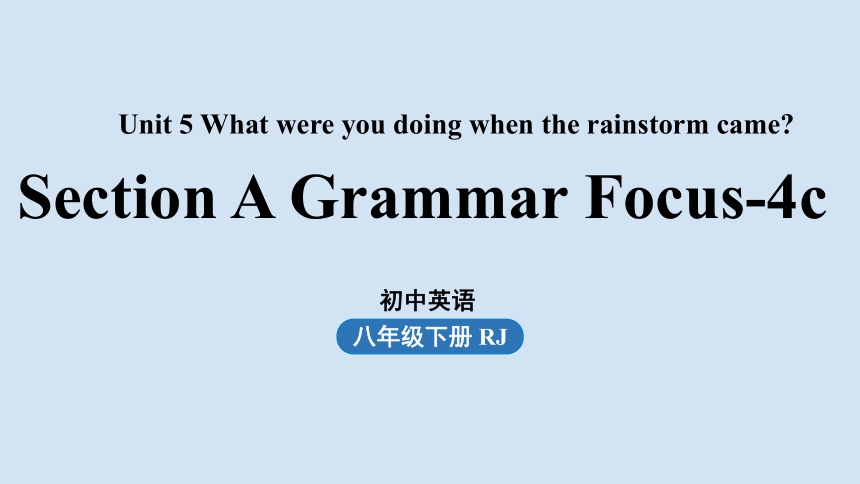 | |
| 格式 | zip | ||
| 文件大小 | 2.1MB | ||
| 资源类型 | 教案 | ||
| 版本资源 | 人教新目标(Go for it)版 | ||
| 科目 | 英语 | ||
| 更新时间 | 2021-12-02 17:06:31 | ||
图片预览

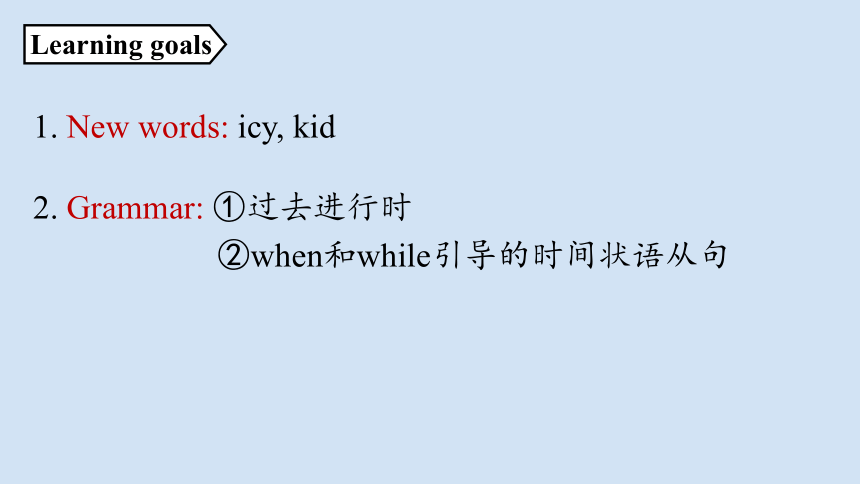
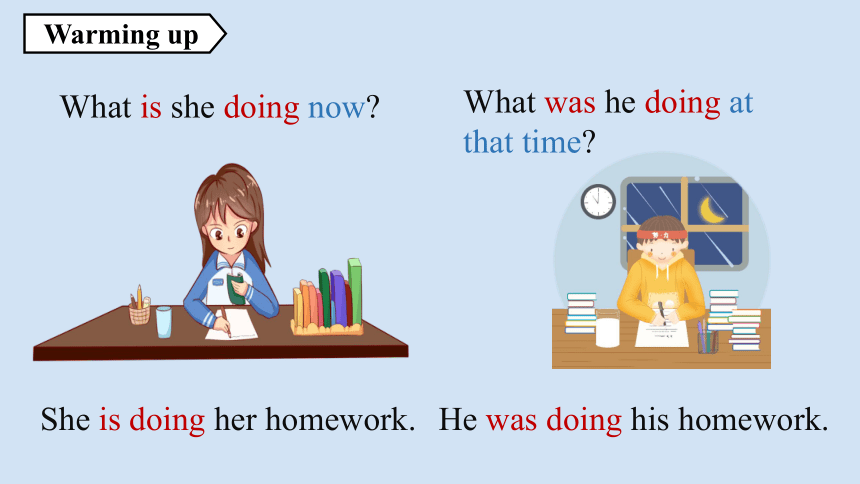
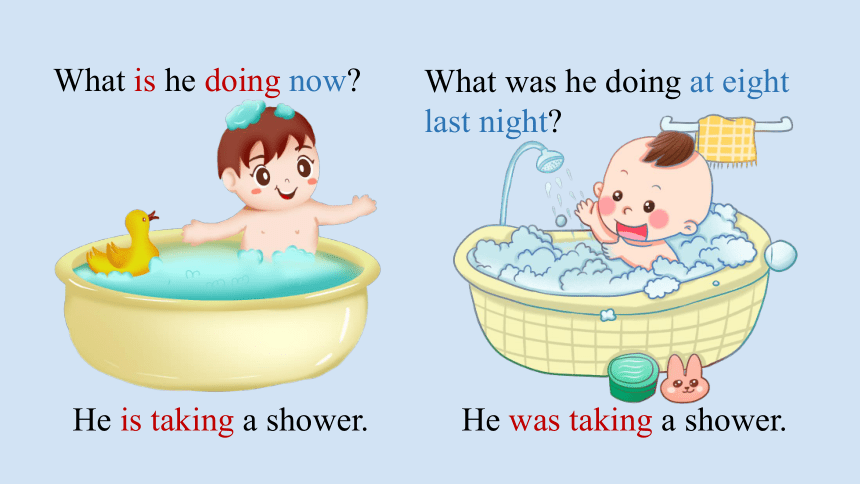
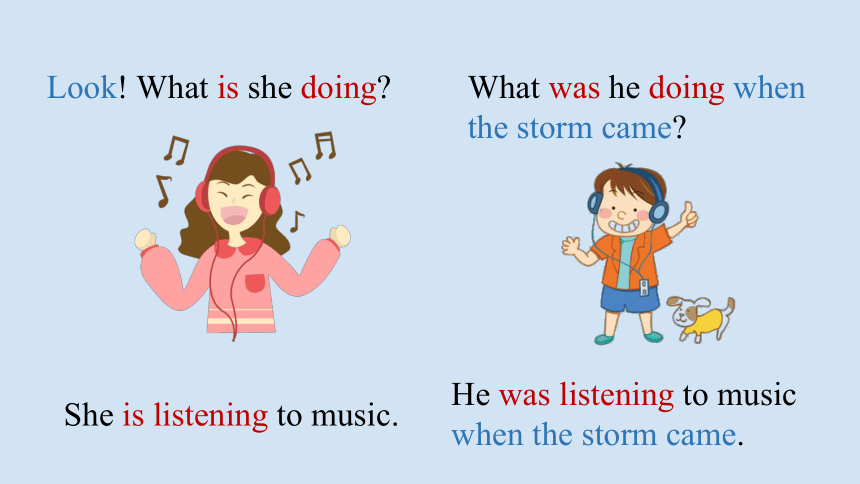
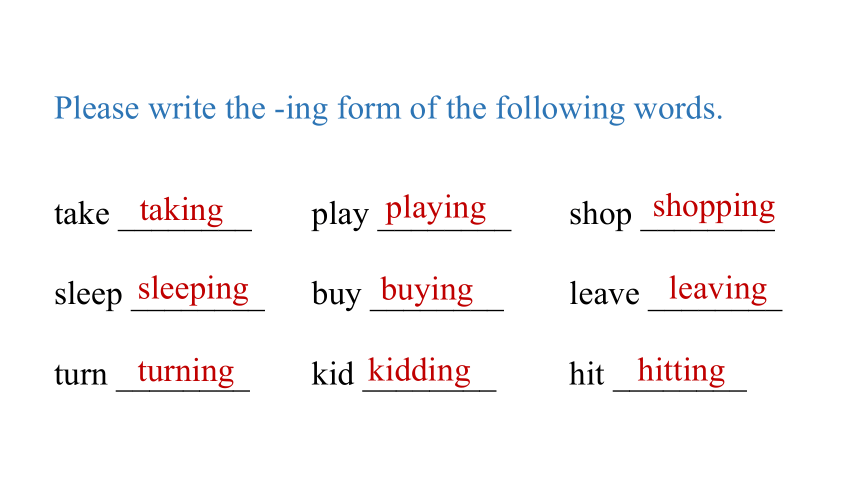
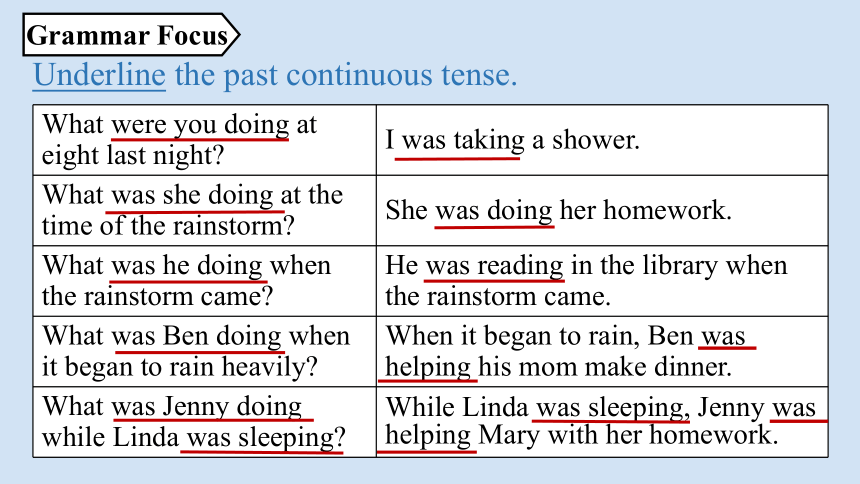
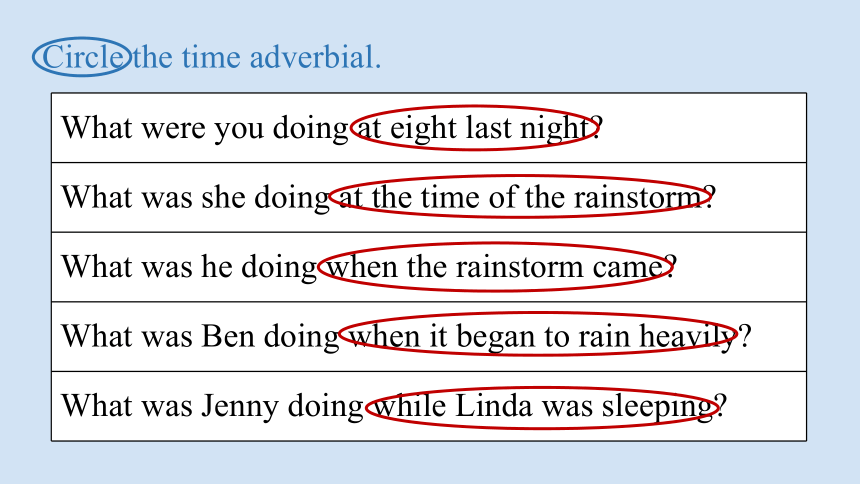
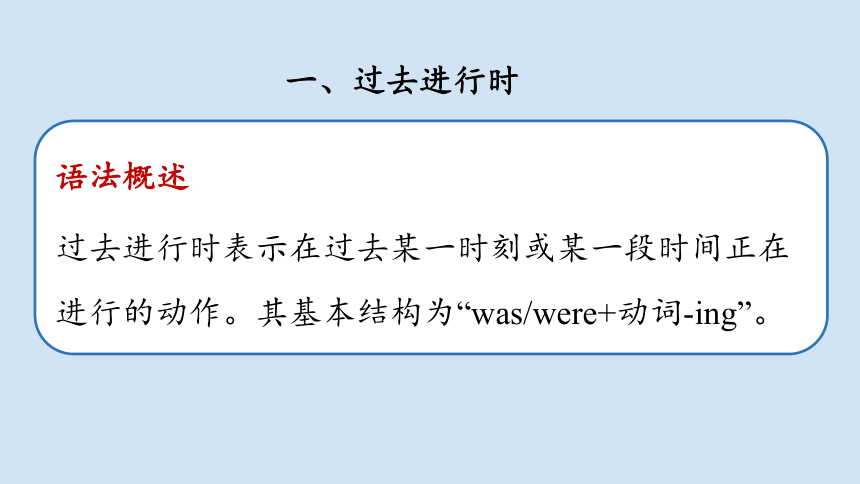
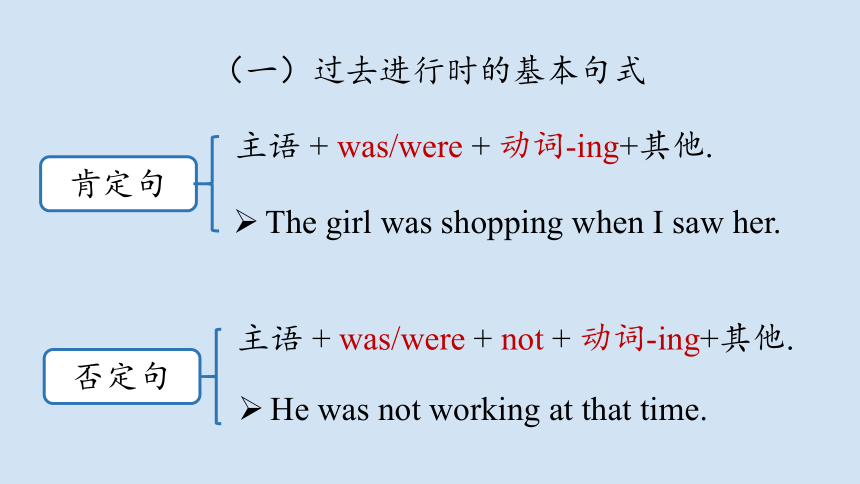
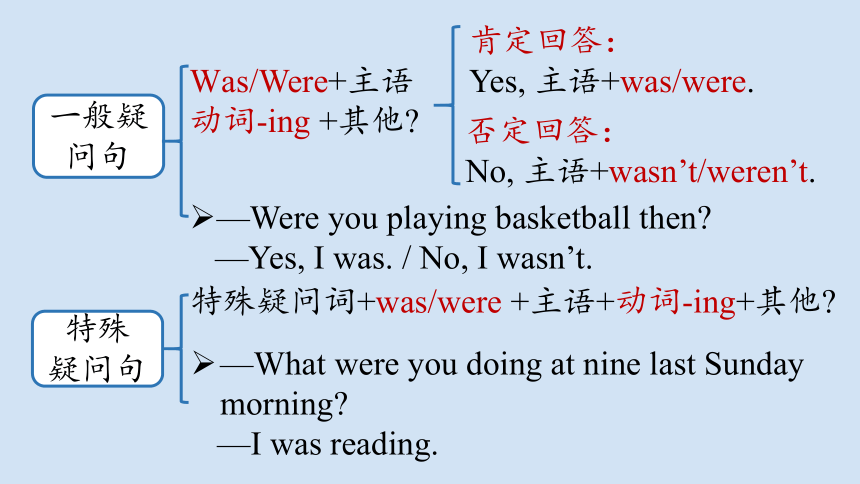
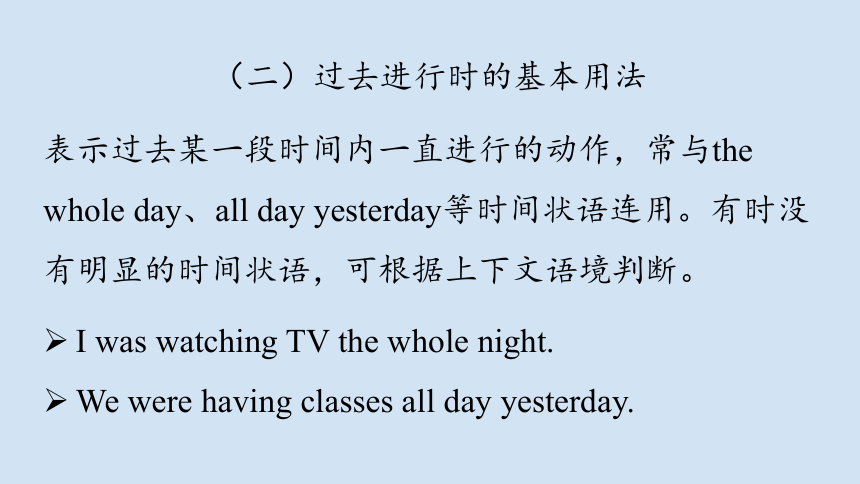
文档简介
(共39张PPT)
Section A Grammar Focus-4c
Unit 5 What were you doing when the rainstorm came
初中英语
八年级下册 RJ
1. New words: icy, kid
2. Grammar: ①过去进行时
②when和while引导的时间状语从句
Learning goals
What is she doing now
She is doing her homework.
What was he doing at
that time
He was doing his homework.
Warming up
What is he doing now
He is taking a shower.
What was he doing at eight
last night
He was taking a shower.
Look! What is she doing
She is listening to music.
What was he doing when the storm came
He was listening to music when the storm came.
take ________ play ________ shop ________
sleep ________ buy ________ leave ________
turn ________ kid ________ hit ________
Please write the -ing form of the following words.
taking
sleeping
turning
playing
buying
kidding
shopping
leaving
hitting
What were you doing at eight last night I was taking a shower.
What was she doing at the time of the rainstorm She was doing her homework.
What was he doing when the rainstorm came He was reading in the library when the rainstorm came.
What was Ben doing when it began to rain heavily When it began to rain, Ben was helping his mom make dinner.
What was Jenny doing while Linda was sleeping While Linda was sleeping, Jenny was helping Mary with her homework.
Underline the past continuous tense.
Grammar Focus
What were you doing at eight last night
What was she doing at the time of the rainstorm
What was he doing when the rainstorm came
What was Ben doing when it began to rain heavily
What was Jenny doing while Linda was sleeping
Circle the time adverbial.
语法概述
过去进行时表示在过去某一时刻或某一段时间正在进行的动作。其基本结构为“was/were+动词-ing”。
一、过去进行时
(一)过去进行时的基本句式
The girl was shopping when I saw her.
主语 + was/were + 动词-ing+其他.
主语 + was/were + not + 动词-ing+其他.
He was not working at that time.
肯定句
否定句
—Were you playing basketball then
—Yes, I was. / No, I wasn’t.
Was/Were+主语
动词-ing +其他
特殊疑问词+was/were +主语+动词-ing+其他
—What were you doing at nine last Sunday morning
—I was reading.
一般疑问句
特殊
疑问句
肯定回答:
Yes, 主语+was/were.
否定回答:
No, 主语+wasn’t/weren’t.
(二)过去进行时的基本用法
I was watching TV the whole night.
We were having classes all day yesterday.
表示过去某一段时间内一直进行的动作,常与the whole day、all day yesterday等时间状语连用。有时没有明显的时间状语,可根据上下文语境判断。
Miss Li was shopping at this time yesterday.
I was looking for my lost cat at nine last Monday
morning.
表示过去某一时刻正在进行或发生的动作,与表示过
去某一时间点的时间状语连用,如at 3 o’clock yesterday afternoon、at this time yesterday等。
(三)现在进行时、一般过去时和过去进行时区别
现在进行时 一般过去时 过去进行时
用法 表示现在或最近正在进行和发生的动作。 表示过去某个时间发生过的动作或存在的状态。强调动作已经结束。 表示过去某一时刻或某一时间正在进行的动作。可表示动作的未完成性。
构成 主语+am/is/are+动词-ing 主语+动词-ed 主语+was/were+动词-ing
时间 now (或引起注意的look/ listen等动词) yesterday, last night, two years ago at eight last night, at the time of the rainstorm, when the rainstorm came, while he was sleeping
What were you doing at eight last night I was taking a shower.
What was she doing at the time of the rainstorm She was doing her homework.
What was he doing when the rainstorm came He was reading in the library when the rainstorm came.
What was Ben doing when it began to rain heavily When it began to rain, Ben was helping his mom make dinner.
What was Jenny doing while Linda was sleeping While Linda was sleeping, Jenny was helping Mary with her homework.
Circle the marker word of the adverbial clause of time.
What were you doing at eight last night I was taking a shower.
What was she doing at the time of the rainstorm She was doing her homework.
What was he doing when the rainstorm came He was reading in the library when the rainstorm came.
What was Ben doing when it began to rain heavily When it began to rain, Ben was helping his mom make dinner.
What was Jenny doing while Linda was sleeping While Linda was sleeping, Jenny was helping Mary with her homework.
Underline the adverbial clause of time.
语法概述
when和while都可意为“当……时”,用来引导时间状语从句,表示主句动作发生的背景。
二、when和while引导的时间状语从句
(一)when引导的时间状语从句
1. 表示主句动作发生的特定时间,既可指时间点,也
可指时间段。
2. 从句的谓语动词可以是延续性动词,也可以是非延
续性动词;从句的动作和主句的动作既可同时发生,
也可以是先后发生。
It was snowing when he arrived at the station.
When he was a child, he always tried out new ideas.
When I got to the airport, the guests had left.
3.从句位于主句之前或之后,当位于主句之前时,与
主句要用逗号分开。
4.当主句为将来时或表示将来意义时,从句要用一般
现在时表示将来。
The boy will be a writer when he grows up.
While I was waiting for the bus, I met my teacher.
while引导的时间状语从句时,从句的谓语动词必须为延续性动词,常用进行时。常见情况有:
(二)while引导的时间状语从句
1. 强调主句动作发生时,从句动作正在进行,此时,从句用进行时。
While Linda was sleeping, Jenny was helping me with my homework.
2.强调主从句动作同时进行时,主从句通常都用进行时。
延续性动词和非延续性动词
如:work、study、drink、eat等。
1.延续性动词指动作可以延续一段时间,而不是瞬间
结束。
2.非延续性动词指动作极为短暂,瞬间结束。
如:start、begin、hit、jump等。
4a Look at the table and write sentences with both while
and when.
John Mary
take photos buy a drink
play the piano leave the house
clean his room turn on the radio
shop take the car to the car wash
While John was taking photos, Mary bought a drink.
John was taking photos when Mary bought a drink.
Presentation
1. While John was playing the piano, Mary left the house.
John was playing the piano when Mary left the house.
2. While John was cleaning his room, Mary turned on the radio.
John was cleaning his room when Mary turned on the radio.
3. While John was shopping, Mary took the car to the car wash.
John was shopping when Mary took the car to the car wash.
At 7:00 a.m., I woke up. ______ I _____ making my breakfast, my brother _____ listening to the radio. ______ I was eating, the radio news talked about a car accident near our home. My brother and I went out right away to have a look. ______ we got to the place of the
4b Fill in the blanks with was, were, when or while.
While
was
was
While
When
看一看
accident, the car _____ in bad shape from hitting a tree. But luckily, the driver _____ fine. The roads ______ icy because of the heavy snow from the night before.
was
were
adj. 覆盖着冰的;冰冷的
was
4c What were you doing at these times last Sunday Fill in
the chart. Then ask your partner.
You Your partner
9:00 a.m.
11:30 a.m.
4:00 p.m.
9:00 p.m.
A: What were you doing at nine o’clock last
Sunday morning
B: I was sleeping. How about you
A: I was doing my homework.
B: You're kidding!
You’re kidding! (教材P36 4c)
kid作动词,其现在分词为kidding,过去式和过去分词
均为kidded。
kid /k d/ v. 开玩笑;欺骗
I didn’t mean it. I was only kidding.
Don’t kid yourself (that) he’ll change.
Language point
They’ve got three kids.
He is just a child.
【拓展】kid还可以作名词,意为“小孩”,复数形
式为kids。正式用语或书面用语中用child表示。
一、单项选择
1. (河北中考) Sorry, I didn’t see you, because I_____ a
picture.
A. draw B. drew C. was drawing D. have drawn
2. (苏州中考) Amon _____ his ship in a big storm when a
giant fish came out of the sea.
A. will sail B. is sailing C. was sailing D. has sailed
C
C
Exercises
3. (2021 常德中考改编) —Why didn’t you answer my WeChat phone at eight o’clock last night
—Sorry, I _____ a walk with my friend along the river.
A. take B. are taking C. was taking D. have taken
4. (凉山州中考) —_____ did the rainstorm come
—While we _____ a physics lesson yesterday.
A. When; have had B. While; are having
C. When; were having D. While; have
C
C
5. (2021 陕西中考改编) One day, while the woman_____ clothes in the river, she saw a great big orange on the water moving slowly towards her.
A. washes B. is washing
C. was washing D. washed
C
6. (2021 河北中考) I love to listen to rock music_____ I am
running.
A. while B. after C. since D. until
7. (镇江中考) —Oh! What’s wrong with your finger
—I hurt it while I _____ a model plane.
A. made B. was making
C. am making D. make
B
A
8. (日照中考) —Didn’t you hear Dad call you
—No, I didn’t. I _____ with Jack on the phone.
A. am talking B. would talk
C. have talked D. was talking
9. (内江中考) Tom said he _____ basketball with his classmates from 4:00 to 6:00 yesterday afternoon.
A. is played B. was playing
C. plays D. had played
B
D
1.不要自欺欺人,他绝对不会同意的。
Don’t _____ _________, he’ll never agree with it!
2.铃响的时候,我正在看电视。
I _____ _________ TV ______ the bell rang.
3.我们先看看菜单和酒单吧。
Let’s _____ ____ ______ at the menu and the wine list.
二、完成句子
kid yourself
was watching when
have a look
Key words
Useful expressions
have a look, take a shower, do one’s
homework, listen to the radio, take photos, clean one’s room
Grammar
icy, kid
Summary
①过去进行时
②when和while引导的时间状语从句
1. Review the past continuous tense and adverbial
clauses of time.
2. Make sentences with when and while, no less than five.
3. Preview the new words and phrases in
Section B 1a-1d.
Homework
谢谢聆听!
THANKS
Section A Grammar Focus-4c
Unit 5 What were you doing when the rainstorm came
初中英语
八年级下册 RJ
1. New words: icy, kid
2. Grammar: ①过去进行时
②when和while引导的时间状语从句
Learning goals
What is she doing now
She is doing her homework.
What was he doing at
that time
He was doing his homework.
Warming up
What is he doing now
He is taking a shower.
What was he doing at eight
last night
He was taking a shower.
Look! What is she doing
She is listening to music.
What was he doing when the storm came
He was listening to music when the storm came.
take ________ play ________ shop ________
sleep ________ buy ________ leave ________
turn ________ kid ________ hit ________
Please write the -ing form of the following words.
taking
sleeping
turning
playing
buying
kidding
shopping
leaving
hitting
What were you doing at eight last night I was taking a shower.
What was she doing at the time of the rainstorm She was doing her homework.
What was he doing when the rainstorm came He was reading in the library when the rainstorm came.
What was Ben doing when it began to rain heavily When it began to rain, Ben was helping his mom make dinner.
What was Jenny doing while Linda was sleeping While Linda was sleeping, Jenny was helping Mary with her homework.
Underline the past continuous tense.
Grammar Focus
What were you doing at eight last night
What was she doing at the time of the rainstorm
What was he doing when the rainstorm came
What was Ben doing when it began to rain heavily
What was Jenny doing while Linda was sleeping
Circle the time adverbial.
语法概述
过去进行时表示在过去某一时刻或某一段时间正在进行的动作。其基本结构为“was/were+动词-ing”。
一、过去进行时
(一)过去进行时的基本句式
The girl was shopping when I saw her.
主语 + was/were + 动词-ing+其他.
主语 + was/were + not + 动词-ing+其他.
He was not working at that time.
肯定句
否定句
—Were you playing basketball then
—Yes, I was. / No, I wasn’t.
Was/Were+主语
动词-ing +其他
特殊疑问词+was/were +主语+动词-ing+其他
—What were you doing at nine last Sunday morning
—I was reading.
一般疑问句
特殊
疑问句
肯定回答:
Yes, 主语+was/were.
否定回答:
No, 主语+wasn’t/weren’t.
(二)过去进行时的基本用法
I was watching TV the whole night.
We were having classes all day yesterday.
表示过去某一段时间内一直进行的动作,常与the whole day、all day yesterday等时间状语连用。有时没有明显的时间状语,可根据上下文语境判断。
Miss Li was shopping at this time yesterday.
I was looking for my lost cat at nine last Monday
morning.
表示过去某一时刻正在进行或发生的动作,与表示过
去某一时间点的时间状语连用,如at 3 o’clock yesterday afternoon、at this time yesterday等。
(三)现在进行时、一般过去时和过去进行时区别
现在进行时 一般过去时 过去进行时
用法 表示现在或最近正在进行和发生的动作。 表示过去某个时间发生过的动作或存在的状态。强调动作已经结束。 表示过去某一时刻或某一时间正在进行的动作。可表示动作的未完成性。
构成 主语+am/is/are+动词-ing 主语+动词-ed 主语+was/were+动词-ing
时间 now (或引起注意的look/ listen等动词) yesterday, last night, two years ago at eight last night, at the time of the rainstorm, when the rainstorm came, while he was sleeping
What were you doing at eight last night I was taking a shower.
What was she doing at the time of the rainstorm She was doing her homework.
What was he doing when the rainstorm came He was reading in the library when the rainstorm came.
What was Ben doing when it began to rain heavily When it began to rain, Ben was helping his mom make dinner.
What was Jenny doing while Linda was sleeping While Linda was sleeping, Jenny was helping Mary with her homework.
Circle the marker word of the adverbial clause of time.
What were you doing at eight last night I was taking a shower.
What was she doing at the time of the rainstorm She was doing her homework.
What was he doing when the rainstorm came He was reading in the library when the rainstorm came.
What was Ben doing when it began to rain heavily When it began to rain, Ben was helping his mom make dinner.
What was Jenny doing while Linda was sleeping While Linda was sleeping, Jenny was helping Mary with her homework.
Underline the adverbial clause of time.
语法概述
when和while都可意为“当……时”,用来引导时间状语从句,表示主句动作发生的背景。
二、when和while引导的时间状语从句
(一)when引导的时间状语从句
1. 表示主句动作发生的特定时间,既可指时间点,也
可指时间段。
2. 从句的谓语动词可以是延续性动词,也可以是非延
续性动词;从句的动作和主句的动作既可同时发生,
也可以是先后发生。
It was snowing when he arrived at the station.
When he was a child, he always tried out new ideas.
When I got to the airport, the guests had left.
3.从句位于主句之前或之后,当位于主句之前时,与
主句要用逗号分开。
4.当主句为将来时或表示将来意义时,从句要用一般
现在时表示将来。
The boy will be a writer when he grows up.
While I was waiting for the bus, I met my teacher.
while引导的时间状语从句时,从句的谓语动词必须为延续性动词,常用进行时。常见情况有:
(二)while引导的时间状语从句
1. 强调主句动作发生时,从句动作正在进行,此时,从句用进行时。
While Linda was sleeping, Jenny was helping me with my homework.
2.强调主从句动作同时进行时,主从句通常都用进行时。
延续性动词和非延续性动词
如:work、study、drink、eat等。
1.延续性动词指动作可以延续一段时间,而不是瞬间
结束。
2.非延续性动词指动作极为短暂,瞬间结束。
如:start、begin、hit、jump等。
4a Look at the table and write sentences with both while
and when.
John Mary
take photos buy a drink
play the piano leave the house
clean his room turn on the radio
shop take the car to the car wash
While John was taking photos, Mary bought a drink.
John was taking photos when Mary bought a drink.
Presentation
1. While John was playing the piano, Mary left the house.
John was playing the piano when Mary left the house.
2. While John was cleaning his room, Mary turned on the radio.
John was cleaning his room when Mary turned on the radio.
3. While John was shopping, Mary took the car to the car wash.
John was shopping when Mary took the car to the car wash.
At 7:00 a.m., I woke up. ______ I _____ making my breakfast, my brother _____ listening to the radio. ______ I was eating, the radio news talked about a car accident near our home. My brother and I went out right away to have a look. ______ we got to the place of the
4b Fill in the blanks with was, were, when or while.
While
was
was
While
When
看一看
accident, the car _____ in bad shape from hitting a tree. But luckily, the driver _____ fine. The roads ______ icy because of the heavy snow from the night before.
was
were
adj. 覆盖着冰的;冰冷的
was
4c What were you doing at these times last Sunday Fill in
the chart. Then ask your partner.
You Your partner
9:00 a.m.
11:30 a.m.
4:00 p.m.
9:00 p.m.
A: What were you doing at nine o’clock last
Sunday morning
B: I was sleeping. How about you
A: I was doing my homework.
B: You're kidding!
You’re kidding! (教材P36 4c)
kid作动词,其现在分词为kidding,过去式和过去分词
均为kidded。
kid /k d/ v. 开玩笑;欺骗
I didn’t mean it. I was only kidding.
Don’t kid yourself (that) he’ll change.
Language point
They’ve got three kids.
He is just a child.
【拓展】kid还可以作名词,意为“小孩”,复数形
式为kids。正式用语或书面用语中用child表示。
一、单项选择
1. (河北中考) Sorry, I didn’t see you, because I_____ a
picture.
A. draw B. drew C. was drawing D. have drawn
2. (苏州中考) Amon _____ his ship in a big storm when a
giant fish came out of the sea.
A. will sail B. is sailing C. was sailing D. has sailed
C
C
Exercises
3. (2021 常德中考改编) —Why didn’t you answer my WeChat phone at eight o’clock last night
—Sorry, I _____ a walk with my friend along the river.
A. take B. are taking C. was taking D. have taken
4. (凉山州中考) —_____ did the rainstorm come
—While we _____ a physics lesson yesterday.
A. When; have had B. While; are having
C. When; were having D. While; have
C
C
5. (2021 陕西中考改编) One day, while the woman_____ clothes in the river, she saw a great big orange on the water moving slowly towards her.
A. washes B. is washing
C. was washing D. washed
C
6. (2021 河北中考) I love to listen to rock music_____ I am
running.
A. while B. after C. since D. until
7. (镇江中考) —Oh! What’s wrong with your finger
—I hurt it while I _____ a model plane.
A. made B. was making
C. am making D. make
B
A
8. (日照中考) —Didn’t you hear Dad call you
—No, I didn’t. I _____ with Jack on the phone.
A. am talking B. would talk
C. have talked D. was talking
9. (内江中考) Tom said he _____ basketball with his classmates from 4:00 to 6:00 yesterday afternoon.
A. is played B. was playing
C. plays D. had played
B
D
1.不要自欺欺人,他绝对不会同意的。
Don’t _____ _________, he’ll never agree with it!
2.铃响的时候,我正在看电视。
I _____ _________ TV ______ the bell rang.
3.我们先看看菜单和酒单吧。
Let’s _____ ____ ______ at the menu and the wine list.
二、完成句子
kid yourself
was watching when
have a look
Key words
Useful expressions
have a look, take a shower, do one’s
homework, listen to the radio, take photos, clean one’s room
Grammar
icy, kid
Summary
①过去进行时
②when和while引导的时间状语从句
1. Review the past continuous tense and adverbial
clauses of time.
2. Make sentences with when and while, no less than five.
3. Preview the new words and phrases in
Section B 1a-1d.
Homework
谢谢聆听!
THANKS
同课章节目录
- Unit 1 What's the matter?
- Section A
- Section B
- Unit 2 I'll help to clean up the city parks.
- Section A
- Section B
- Unit 3 Could you please clean your room?
- Section A
- Section B
- Unit 4 Why don't you talk to your parents?
- Section A
- Section B
- Unit 5 What were you doing when the rainstorm came
- Section A
- Section B
- Review of Units 1-5
- Unit 6 An old man tried to move the mountains.
- Section A
- Section B
- Unit 7 What's the highest mountain in the world?
- Section A
- Section B
- Unit 8 Have you read Treasure Island yet?
- Section A
- Section B
- Unit 9 Have you ever been to a museum?
- Section A
- Section B
- Unit 10 I've had this bike for three years.
- Section A
- Section B
